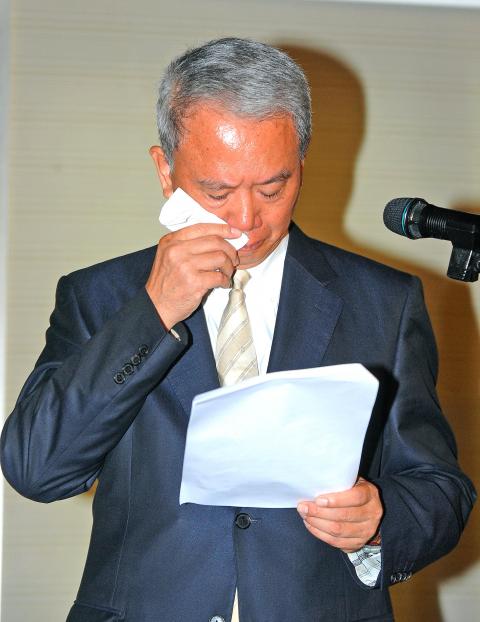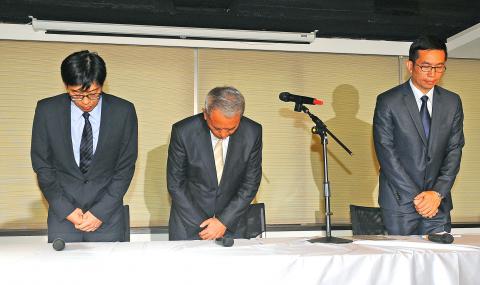Ting Hsin International Group (頂新集團) said yesterday that it would shut down two of its subsidiaries until consumer confidence is restored.
Ting Hsin Oil and Fat Industrial Co (頂新製油實業) and Cheng I Food Co Ltd (正義) are to suspend operations until consumers’ food safety concerns end, Wei Ying-chun (魏應充), former chairman of Ting Hsin Oil, Cheng I and Wei Chuan Foods Corp (味全食品工業), said at a press conference.
It was Wei’s first public appearance since Cheng I was accused on Wednesday last week of adding oil meant for animal feed to products meant for human consumption.

Photo: Wang Min-wei, Taipei Times
“I really have to apologize to the public for making them uneasy,” said Wei, who left his role as chairman of the three firms on Thursday last week amid the latest cooking oil scandal.
In addition to the temporary shutdowns, the presidents of the two subsidiaries would also step down, Wei said.
The Ting Hsin group will invite food safety experts and consultants to inspect and evaluate the safety issues facing the firms, Wei said, adding that exiting the nation’s cooking oil manufacturing market for good may be an option if the group cannot assure food safety in the future.

Photo: Wang Min-wei, Taipei Times
Wei said the group promises to take “the best care” of the about 260 employees to be affected by the closures.
Sales for the two companies averaged NT$2 billion to NT$2.2 billion (US$65.7 million to US$72.3 million) a year.
While apologizing to the public, employees, shareholders and the government over the latest scandal, Wei said the group would take full responsibility for consumers’ rights, but did not specify details of any potential compensation plans.
Wei choked with sobs several times during the press conference, reiterating that he would become a lifelong volunteer contributor to the nation’s food safety, hoping consumers would give the food firm one more chance to stand up.
However, even though Wei made pledges to reform the two companies’ management and ensure food safety, Ting Hsin faces rising pressure from consumers, as well as several city and county governments, amid a wide range of product boycotts, as this has been the third food safety scandal involving the group within a year.
Meanwhile, shares of Wei Chuan, a listed subsidiary of the group, might face another selling spree tomorrow.
On Thursday, Wei Chuan, the nation’s second-largest food manufacturer, saw its shares tumble 6.25 percent to close at NT$31.5, shrinking for the second straight trading day amid the scandal.

DAREDEVIL: Honnold said it had always been a dream of his to climb Taipei 101, while a Netflix producer said the skyscraper was ‘a real icon of this country’ US climber Alex Honnold yesterday took on Taiwan’s tallest building, becoming the first person to scale Taipei 101 without a rope, harness or safety net. Hundreds of spectators gathered at the base of the 101-story skyscraper to watch Honnold, 40, embark on his daredevil feat, which was also broadcast live on Netflix. Dressed in a red T-shirt and yellow custom-made climbing shoes, Honnold swiftly moved up the southeast face of the glass and steel building. At one point, he stepped onto a platform midway up to wave down at fans and onlookers who were taking photos. People watching from inside

A Vietnamese migrant worker yesterday won NT$12 million (US$379,627) on a Lunar New Year scratch card in Kaohsiung as part of Taiwan Lottery Co’s (台灣彩券) “NT$12 Million Grand Fortune” (1200萬大吉利) game. The man was the first top-prize winner of the new game launched on Jan. 6 to mark the Lunar New Year. Three Vietnamese migrant workers visited a Taiwan Lottery shop on Xinyue Street in Kaohsiung’s Gangshan District (崗山), a store representative said. The player bought multiple tickets and, after winning nothing, held the final lottery ticket in one hand and rubbed the store’s statue of the Maitreya Buddha’s belly with the other,

‘NATO-PLUS’: ‘Our strategic partners in the Indo-Pacific are facing increasing aggression by the Chinese Communist Party,’ US Representative Rob Wittman said The US House of Representatives on Monday released its version of the Consolidated Appropriations Act, which includes US$1.15 billion to support security cooperation with Taiwan. The omnibus act, covering US$1.2 trillion of spending, allocates US$1 billion for the Taiwan Security Cooperation Initiative, as well as US$150 million for the replacement of defense articles and reimbursement of defense services provided to Taiwan. The fund allocations were based on the US National Defense Authorization Act for fiscal 2026 that was passed by the US Congress last month and authorized up to US$1 billion to the US Defense Security Cooperation Agency in support of the

‘COMMITTED TO DETERRENCE’: Washington would stand by its allies, but it can only help as much as countries help themselves, Raymond Greene said The US is committed to deterrence in the first island chain, but it should not bear the burden alone, as “freedom is not free,” American Institute in Taiwan Director Raymond Greene said in a speech at the Institute for National Defense and Security Research’s “Strengthening Resilience: Defense as the Engine of Development” seminar in Taipei yesterday. In the speech, titled “Investing Together and a Secure and Prosperous Future,” Greene highlighted the contributions of US President Donald Trump’s administration to Taiwan’s defense efforts, including the establishment of supply chains for drones and autonomous systems, offers of security assistance and the expansion of